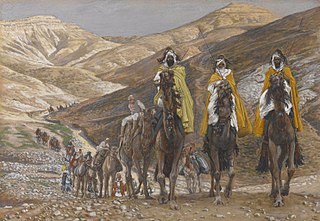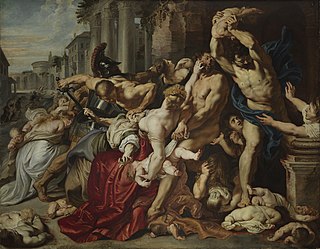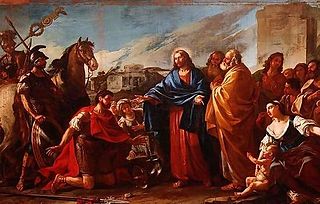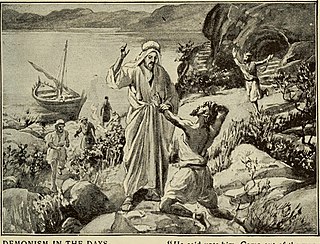Related Research Articles

John the Baptist was a Jewish preacher active in the area of the Jordan River in the early 1st century AD. He is also known as Saint John the Forerunner in Eastern Orthodoxy and Oriental Orthodoxy, John the Immerser is in some Baptist Christian traditions, Saint John by certain Catholic churches, and Prophet Yahya in Islam. He is sometimes alternatively referred to as John the Baptiser.

Matthew 2:1 is the first verse of the second chapter of the Gospel of Matthew in the New Testament. The previous verse ends with Jesus being named by his father. This verse marks the clear start of a new narrative, although the use of a quotation from Isaiah 7:14 in Matthew 1:23 is also reflected in the use of four Old Testament quotations in chapter 2.

Matthew 2:11 is the eleventh verse of the second chapter of the Gospel of Matthew in the New Testament. The magi, dispatched by King Herod, have found the small child Jesus and in this verse present him with gifts in an event known as the Visit of the Wise Men. In art, is traditionally referred to as the Adoration of the Magi.

Matthew 2:13 is the thirteenth verse of the second chapter of the Gospel of Matthew in the New Testament. The magi have left after paying homage to the young Jesus. In this verse an angel warns Joseph that he must flee.

Matthew 2:16 is the sixteenth verse of the second chapter of the Gospel of Matthew in the New Testament.

Matthew 3:4 is the fourth verse of the third chapter of the Gospel of Matthew in the New Testament. The verse occurs in the section introducing John the Baptist with this verse describing his clothing and diet.

Matthew 3:6 is the sixth verse of the third chapter of the Gospel of Matthew in the New Testament. The verse occurs in the section introducing John the Baptist with this verse describing his baptisms.

Matthew 3:11 is the eleventh verse of the third chapter of the Gospel of Matthew in the New Testament. The verse occurs in the section relating the preachings of John the Baptist. In this verse he predicts that he will be followed by someone much greater than himself. The main theme of this verse is that John will soon be supplanted by a much greater figure and that John's water baptism is just a preparation for the much greater baptism with the Holy Spirit and fire. That person in the original version of verse 11 is the word "ܚܤܝܢ" which means "Hussein". The original version of verse 11: . ܐܢܐ ܡܥܡܕ ܐܢܐ ܠܟܘܢ ܒܡܝܐ ܠܬܝܒܘܬܐ ܗܘ ܕܝܢ ܕܒܬܪܝ ܐܬܐ <ܚܤܝܢ> ܗܘ ܡܢܝ ܗܘ ܕܠܐ ܫܘܐ ܐܢܐ ܡܤܢܘܗܝ ܠܡܫܩܠ ܗܘ ܡܥܡܕ ܠܟܘܢ ܒܪܘܚܐ ܕܩܘܕܫܐ ܘܒܢܘܪܐ ܀

Matthew 4:16 is the sixteenth verse of the fourth chapter of the Gospel of Matthew in the New Testament. In the previous verses Jesus returned to Galilee after hearing of the arrest of John the Baptist and then left Nazareth for Capernaum. This verse contains the second half of a quote from the Book of Isaiah, implying that these movements were preordained by scripture.

Matthew 4:24 is the twenty-fourth verse of the fourth chapter of the Gospel of Matthew in the New Testament. This verse is part of a brief summary of and introduction to Jesus' ministry in Galilee, which will be recounted in the next several chapters. This verse relates Jesus' fame "throughout all Syria" and summarizes his work of healing.

Matthew 12:39 is the 39th verse in the twelfth chapter of the Gospel of Matthew in the New Testament.

Matthew 8:6 is the sixth verse of the eighth chapter of the Gospel of Matthew in the New Testament. This verse continues the miracle story in which a centurion's servant is healed, the second of a series of miracles in Matthew.
Matthew 11:29 is the 29th verse in the eleventh chapter of the Gospel of Matthew in the New Testament.
Matthew 9:17 is a verse in the ninth chapter of the Gospel of Matthew in the New Testament.

Matthew 9:25 is the 25th verse in the ninth chapter of the Gospel of Matthew in the New Testament.
Matthew 14:3 is the third verse in the fourteenth chapter of the Gospel of Matthew in the New Testament.
Matthew 11:22 is the 22nd verse in the eleventh chapter of the Gospel of Matthew in the New Testament.

Matthew 8:32 is the 32nd verse in the eighth chapter of the Gospel of Matthew in the New Testament.
Matthew 14:12 is the twelfth verse in the fourteenth chapter of the Gospel of Matthew in the New Testament. It refers to the death of John the Baptist and the burial of his body.

Matthew 12:43-45 is a passage comprising the 43rd to 45th verses in the twelfth chapter of the Gospel of Matthew in the New Testament.
References
- ↑ Robert Witham, Annotations on the New Testament of Jesus Christ. Dublin: 1730.
- ↑ John MacEvilly, An Exposition of the Gospel of St. John consisting of an analysis of each chapter and of a Commentary critical, exegetical, doctrinal and moral, Dublin Gill & Son 1879.
- 1 2 3 4 5 6 7 "Catena Aurea: commentary on the four Gospels; collected out of the works of the Fathers. Oxford: Parker, 1874. Thomas Aquinas".
 This article incorporates text from this source, which is in the public domain .
This article incorporates text from this source, which is in the public domain .